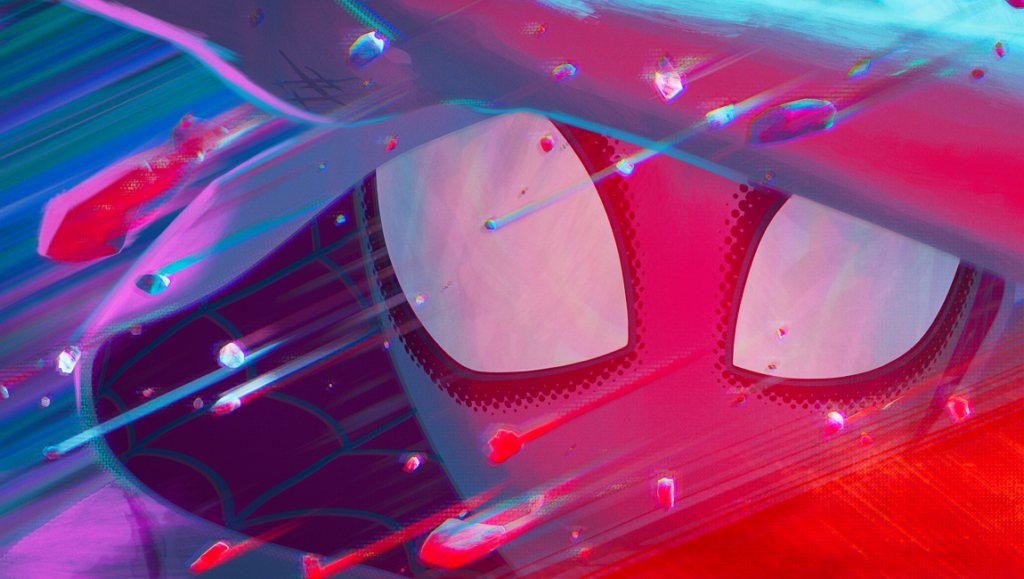In a movie landscape dense with stodgy prequels, unremarkable sequels, and remakes that nobody asked for, Spider-Man: Across the Spider-Verse is that rare thing: a palpably joyous second installment in a franchise that, far from overstaying its welcome, is only just warming up. It’s not so much a breath of fresh air as a life-sustaining gust, and it’s hard to think of a better way to spend an afternoon at the movies than buoying along in its slipstream.
2018’s Spider-Man: Into the Spider-Verse introduced audiences to Miles Morales (Shameik Moore), an Afro-Latino kid from Bed-Stuy, Brooklyn bit by a radioactive spider while graffitiing an abandoned subway tunnel. Unlike Batman, Miles has two loving parents: Jefferson (Brian Tyree Henry), a cop about to get promoted to Captain, and Rio (Luna Lauren Vélez), a nurse. Both are loving and kind, if understandably frustrated by their son’s slipperiness. Neither is Miles a shunned mutant like the X-Men, nor an alien creature like Superman. But there is something (else) that makes him different from all the humans in his life — and as well, something that sets him apart from all the other Spider-Men he keeps bumping into. As Miles discovers, the spider that bit him was actually from a different universe. It wasn’t meant for him. His entire Spider-Man alter ego was never supposed to happen. And yet…enter multiverse.
This conceit — that Miles is one of a near-infinite number of Spider-Mans, all fighting crime in their own cozy little slice of the universe — is a storytelling gold mine. The deeper you dig, the more there is to find. Directors Joaquim Dos Santos, Kemp Powers, and Justin K. Thompson have fashioned from familiar comic-book lore and a fifty-year old franchise an entry that’s every bit as hyperactive, dizzying, and kinetically imaginative as our chronically online, ADHD-riddled brains. Memes, easter eggs, and snippets of pop culture from the Renaissance to, like, yesterday all put in an appearance, if only you can spot them from the thicket of references unfolding onscreen. Visually, the movie revels in gorgeous montages of Miles zipping around the city in a perpetual golden hour, splashing through water towers and vaulting across above ground subways. When night finally falls, characters are traced in glitchy, chromatic lines that pulse as if transmitting 2D heartbeats. Even everyday textures, from the glossy hood of Miles’ Spider-Man costume to the grimy taped-up posters on his bedroom walls, are recognizable but amped, thrillingly hyper-real.
Into the Spider-Verse is set about a year after the first installment of the series. This Miles is a bit taller, and quietly in the throes of mourning the twin losses of Uncle Aaron (Mahershala Ali) and Gwen Stacy (Hailee Steinfeld). He’s also — much like this movie itself — stronger, quippier, and more confident. He can’t always make it to his guidance counselor appointments, but he handles run-of-the-mill baddies with a dismissive sneer. The only one who’s evaded his web so far is The Spot (Jason Schwartzman), an ex-scientist named Jonathan Ohnn who resembles a walking inkblot, if each stain were a portal to another dimension. He might not be the most menacing nemesis we’ve ever seen, but definitely don’t call him a villain of the week.
Luckily, an interdimensional cleanup club (er, “elite strike force”) known as the Spider-Crew was formed to round up stragglers and wrangle them back to their home universe. They’re led by the stone-faced “ninja vampire” Spider-Man 2099 Miguel O’Hara (Oscar Isaac), the straight-talking and heavily pregnant Spider-Woman Jessica Drew (Issa Rae), and Spider-Punk (Daniel Kaluuya), a cockney lout named Hobie who looks like the unholy love child of Sid Vicious and Basquiat. Unlike the ragtag gang of optimists that banded together at the end of Into the Spider-Verse — Spider-Ham, anyone? — this team is older and tougher, with a lot more to lose and significantly less patience.
For Gwen, their newest and youngest member, slipping away from the squad for a quick sojourn to Bed-Stuy is a harmless bit of hooky. How else is she supposed to stoke the “will they, won’t they” tension and hang underneath the Williamsburg Savings Bank like a sleek blonde gargoyle? But for the crew, it’s unforgivable. Especially when Miles, visiting Pavitr Prabhakar (Karan Soni) in delightfully riotous Mumbattan (yes, the traffic’s terrible), saves a police captain from what was supposed to be certain death. It turns out the universe, already delicate since the team played fast and loose with space and time in the first movie, is connected by no more than gossamer threads of canonical storylines that replicate across every universe. And by snipping one of those threads, as Miles did when he saved Captain Singh, the entire known universe is now in danger of collapsing like a house of cards. And the only way to repair it is to let the canon in his own universe — the one involving his father, Captain Morales — play out unchecked.
\This sets up a delicious moral dilemma, while letting Across the Spider-Verse — an upstart entry in a well-established franchise — break its own, already tenuous, fourth wall. This particular quandary, but also the entire movie in which it’s set, is what happens when someone who knows the canon inside and out decides that maybe it’s not that important after all: guideline, not gospel. What’s the worst that could happen? We’ll have to wait for the sequel, slated for 2024, to find out. But now might be a good time to evoke another example of morality turned monstrous: Gotham’s Harvey Dent, who famously said, “you either die young or live long enough to see yourself become the villain.” Miles might think he knows which side he falls on, and maybe he does. There’s just all the other versions of him to contend with.
Published as part of InRO Weekly — Volume 1, Issue 22.


Comments are closed.